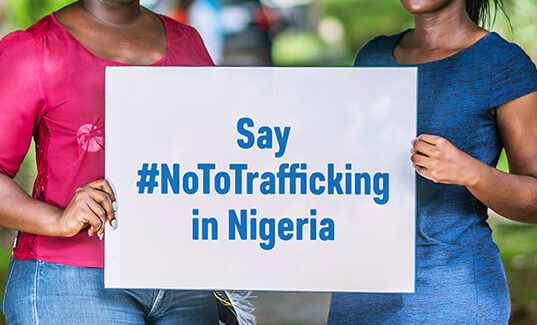QNET, a lifestyle and wellness e-commerce company, says it has launched a ‘Say No,’ a public awareness campaign, aimed at educating people on the dangers of fake jobs and human trafficking.
QNET said this in a statement signed by Mr Biram Fall, the company’s Regional General Manager for Sub-Saharan Africa, which was made available to the News Agency of Nigeria (NAN) on Tuesday in Lagos.
Fall said the initiative was aimed at educating communities on the dangers of fake job offers used by fraudsters to lure members of the public into human trafficking.
According to him, the United Nations Office on Drugs and Crime (UNODC) defines human trafficking as a global crime that trades in people and exploits them for profit.
He said people of all genders, ages and backgrounds could become victims of human trafficking, which occurred in every region of the world.
Fall explained that traffickers used violence, fraudulent employment agencies, and fake promises of education and job opportunities to trick, coerce and deceive their victims.
“Across Africa and in Nigeria, companies such as QNET, Coca-Cola and even the West African Development Bank (BOAD) have fallen victim to scammers who use their reputable names to deceitfully promise non-existent jobs to members of the public for purposes of exploitation.
“The lack of awareness about such scams and about human trafficking is therefore, a key challenge in the fight against the vice.
“Human trafficking not only destroys the lives of victims and communities, but regrettably scammers often use the names of reputable companies such as QNet to promise fake jobs,” Fall said.
He said the private sector should support the efforts of states to tackle the menace, adding that, the Say No awareness campaign was QNET’s contribution.
According to him, the initiative seeks to empower communities with the knowledge and awareness they need to Say No to the traffickers who want to rob them of their future.
Fall said the Nigerian government, in collaboration with the National Agency for the Prohibition of Trafficking in Persons (NAPTIP), had made sustainable efforts to combat human trafficking.
He said the United States Department of State’s Trafficking in Persons report showed that Nigeria had been placed on tier two, reflecting significant governmental endeavour.
Fall said the report indicated an increase in the identification of trafficking victims, rising from 935 in the previous reporting period to 1,634 in 2023.
Also, Akeem Ajisafe, Managing Director of Transblue Ltd., the Nigerian partner of QNET said: “The Nigerian government, in collaboration with NAPTIP and other relevant agencies, have shown unwavering commitment to combating human trafficking.
“Their dedicated efforts can be seen in the increased identification of trafficking victims, which showcases a proactive stance in addressing this critical issue.
“The Say No campaign aims to amplify these efforts by educating the youth in Nigeria on recognising and avoiding fraudulent job offers.’’
He said empowering the younger generation with knowledge, was essential in fortifying the collective stand against human trafficking.
Ajisafe said that the Say No campaign would be implemented in several countries, starting with Burkina Faso, Nigeria and Senegal.
According to him, it consists of a public education campaign that will use radio, billboards, pamphlets and other activities, aimed at sensitising communities, especially in regions where the prevalence of fake job scams is high.
Ajisafe also said QNET had implemented several measures to prevent the use of its platforms to perpetrate fraud.
He said the move included the implementation of customer identification technology that blocked users from buying products or referring customers from a country different from their own.
Ajisafe said with the technology, only users with verified identity documents could refer other customers.
“Any individual found fraudulently using the company’s name shall be reported to the authorities, and QNet will seek full punishment according to the law,” he said.
NAN









